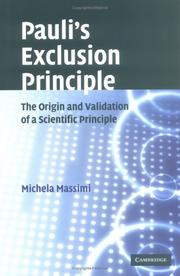| Listing 1 - 2 of 2 |
Sort by
|

ISBN: 0521839114 9780521839112 9780511535352 9781107410732 1107410738 9780511127946 0511127944 051112659X 9780511126598 0511127413 9780511127410 051153535X 1280434813 9781280434815 1107150981 9786610434817 0511200102 0511182481 0511300530 Year: 2005 Publisher: Cambridge Cambridge University Press
Abstract | Keywords | Export | Availability | Bookmark
 Loading...
Loading...Choose an application
- Reference Manager
- EndNote
- RefWorks (Direct export to RefWorks)
There is hardly another principle in physics with wider scope of applicability and more far-reaching consequences than Pauli's exclusion principle. This 2005 book explores the principle's origin in the atomic spectroscopy of the early 1920s, its subsequent embedding into quantum mechanics, and later experimental validation with the development of quantum chromodynamics. The reconstruction of this crucial historic episode provides an excellent foil to reconsider Kuhn's view on incommensurability. The author defends the prospective rationality of the revolutionary transition from the old to the new quantum theory around 1925 by focusing on the way Pauli's principle emerged as a phenomenological rule 'deduced' from some anomalous phenomena and theoretical assumptions of the old quantum theory. The subsequent process of validation is historically reconstructed and analysed within the framework of 'dynamic Kantianism'. The variety of themes skilfully interwoven in this book will appeal to philosophers, historians, scientists and anyone interested in philosophy.
Pauli exclusion principle. --- Quantum mechanics. Quantumfield theory --- Pauli exclusion principle --- Exclusion principle, Pauli --- Nuclear spin --- Particles (Nuclear physics) --- Quantum theory --- Nuclear physics. --- Atomic nuclei --- Atoms, Nuclei of --- Nucleus of the atom --- Physics
Book
ISBN: 1400889294 9781400889297 9780691174938 0691174938 9780691174938 Year: 2018 Publisher: Princeton, NJ
Abstract | Keywords | Export | Availability | Bookmark
 Loading...
Loading...Choose an application
- Reference Manager
- EndNote
- RefWorks (Direct export to RefWorks)
This book explores the role of causal constraints in science, shifting our attention from causal relations between individual events--the focus of most philosophical treatments of causation-to a broad family of concepts and principles generating constraints on possible change. Yemima Ben-Menahem looks at determinism, locality, stability, symmetry principles, conservation laws, and the principle of least action-causal constraints that serve to distinguish events and processes that our best scientific theories mandate or allow from those they rule out.Ben-Menahem's approach reveals that causation is just as relevant to explaining why certain events fail to occur as it is to explaining events that do occur. She investigates the conceptual differences between, and interrelations of, members of the causal family, thereby clarifying problems at the heart of the philosophy of science. Ben-Menahem argues that the distinction between determinism and stability is pertinent to the philosophy of history and the foundations of statistical mechanics, and that the interplay of determinism and locality is crucial for understanding quantum mechanics. Providing historical perspective, she traces the causal constraints of contemporary science to traditional intuitions about causation, and demonstrates how the teleological appearance of some constraints is explained away in current scientific theories such as quantum mechanics.Causation in Science represents a bold challenge to both causal eliminativism and causal reductionism-the notions that causation has no place in science and that higher-level causal claims are reducible to the causal claims of fundamental physics.
Causation. --- Science --- Causality --- Cause and effect --- Effect and cause --- Final cause --- Beginning --- God --- Metaphysics --- Philosophy --- Necessity (Philosophy) --- Teleology --- Normal science --- Philosophy of science --- Philosophy. --- Causalità. --- Bertrand Russell. --- Curie's principle. --- Donald Davidson. --- Erwin Schrödinger. --- God. --- Heisenberg uncertainty relations. --- I. Pitowsky. --- Leonhard Euler. --- Pauli exclusion principle. --- Pierre-Louis Moreau de Maupertuis. --- S. Popescu. --- causal constraints. --- causal eliminativism. --- causal family. --- causal reductionism. --- causal relations. --- causality. --- causation. --- causes. --- change. --- conservation laws. --- determinism. --- directionality. --- dynamics. --- emergence. --- entanglement. --- fate. --- gauge freedom. --- gauge theories. --- higher-level causation. --- higher-level eliminativism. --- indeterminism. --- instability. --- lawlessness. --- least action principle. --- locality. --- necessity. --- nonlocality. --- philosophy of mind. --- physical theories. --- physics. --- probability. --- quantum mechanics. --- reasons. --- reduction. --- science. --- stability. --- statistical mechanics. --- sufficient reason principle. --- symmetries. --- teleological thinking. --- teleology. --- variation principles.
| Listing 1 - 2 of 2 |
Sort by
|

 Search
Search Feedback
Feedback About UniCat
About UniCat  Help
Help News
News